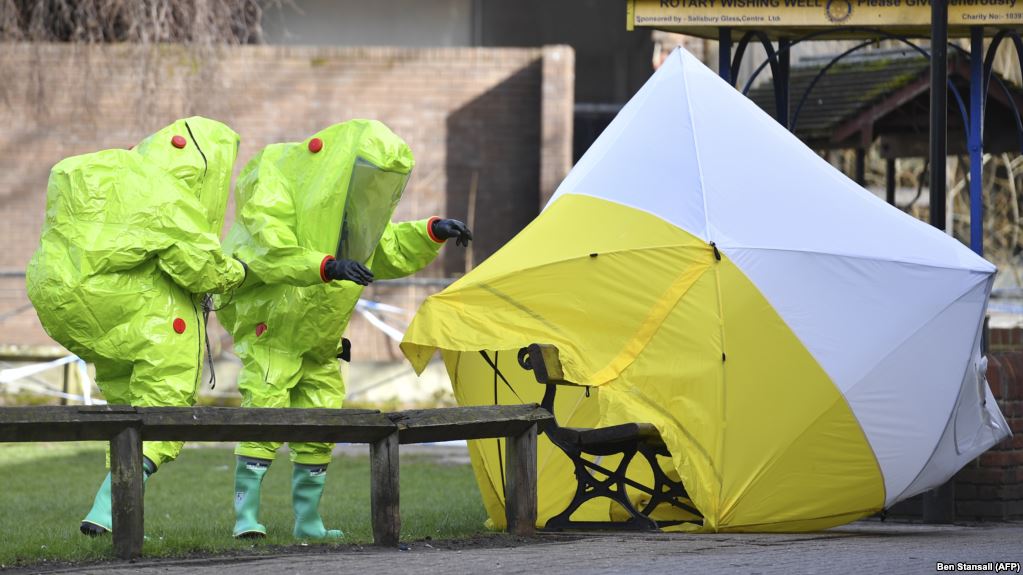
During this time, I have been shuttling between Moscow, my home of fifteen years; London, my birthplace; and the U.S., which I visit for work. Shortly after touching down in London, I watched Boris Johnson’s appearance on the Andrew Marr show, where he pointed the finger first at Moscow, and then Putin himself, while declining to specify the evidence on which his certainty was founded. An hour later, as I sat down to lunch, the radio was recycling the TV debate, this time editing out speculation and rhetorical flourishes and settling for a somber and self-evident factual format. The news about Putin and the Russians played out in my head against the certainties I had just left behind in Moscow. There, my colleagues, family and even some of my ‘pro-Western’ students were picking holes in the British account and judging the claims of Russian involvement to be simply silly. So, there was utter self-assurance at both ends of the Eurasian continent.
But it went further than self-assurance. This latest phase in the ‘new Cold War’ seemed to provide the perfect (and even much-needed) vent for a therapeutic self-righteousness. Unlike in the first Cold War, Russians, Britons and Americans live lives that are deeply intertwined. There’s no iron curtain—in the US, I was lecturing American students who were getting ready to spend a semester in Moscow, as well as Russian students finishing degrees in Iowa, Vermont and Pennsylvania. And yet, the idea that globalisation and multiculturalism lead to increased mutual understanding seems sometimes to be a bit off the mark. Of course, pirogi and Baltika beer are easier to come by nowadays in “Londongrad”. But then there’s the downside of McMafia.
In my own (less dramatic) sphere, education, things aren’t straightforward either. One British talk-show participant opined that Theresa May should hit Russia where it really hurts: in the financial sector. Another added that perhaps Russian students should be excluded from British private schools, but then decided that educating them there would have a liberalising and democratising effect on them that could prevent future Skripal affairs. I found this odd; in my experience, the British-educated Russians in my Moscow classes are sometimes equipped with a double portion of snobbery and elitism—one imported, one home-grown—and they take up their places in the oligarchic hierarchy with heightened panache. And, after all, why would these institutions, which are so associated with Britain’s own lack of egalitarianism, somehow have a democratising effect on Russia? Instead, what seemed to lie behind this sentiment was a quiet sense of British superiority dating back to imperial days—which had survived, it seemed, the brute fact that these schools, like the banks, need Russian cash.
In the U.S., I noticed the increased number of Chinese students on different campuses, and observed a similar assumption that they too could be a tool for American soft power influence when they graduate. But I found myself agreeing with a journalist who wrote that the new ultra-liberal censorship on American campuses (an odd and dismaying example of which I myself encountered) would only teach them that limits on freedom of speech and thought is just fine. I spend most of my time in Moscow, and therefore have got used to editing out rants about the ‘degenerate West’, which are often skin-deep rhetorical flourishes. Given that only 20 per cent of Russians travel abroad and much of the media is state-controlled, a bit of steam-letting ranting is to be expected. But I have, perhaps, become naïvely shockable when it comes to Western rants against Russia. The best rants feed on the internal anger that is stoked by the painfully divided nature of British and American society. After all, offence is the order of the day now. ‘Liberals’ and ‘conservatives’ in the UK (Brexiteers versus Remainers) and the U.S. (Trump-supporters and -haters) consider each other non-persons, aliens whose every utterance evokes offence and contempt. The fact that Russia can evoke such emotion goes to show that globalisation has made that country an internal part of ‘Western’ consciousness—but not in a good way. Now Russia— both government and society—must behave as each Western faction expects it to. If it doesn’t conform point-by-point on LGBT rights or church–state separation, it is a personal offence. And it’s all the more offensive since there seems to be a subliminal sense that the West’s own most cherished ideals and institutions are no longer self-evidently justifiable, but need to be defended by hoarse fiat rather than self-confident logic—as was the case in the first Cold War. The Skripal affair has added more salt to the wound of this cultural and political crisis. People are reaching back to the rhetoric of the first Cold War. But the whiff of hysteria, and the blindness to one’s own faults, makes these discussions less convincing. That, for me, was the irrefutable lesson here, whatever the details of the case eventually turn out to be.